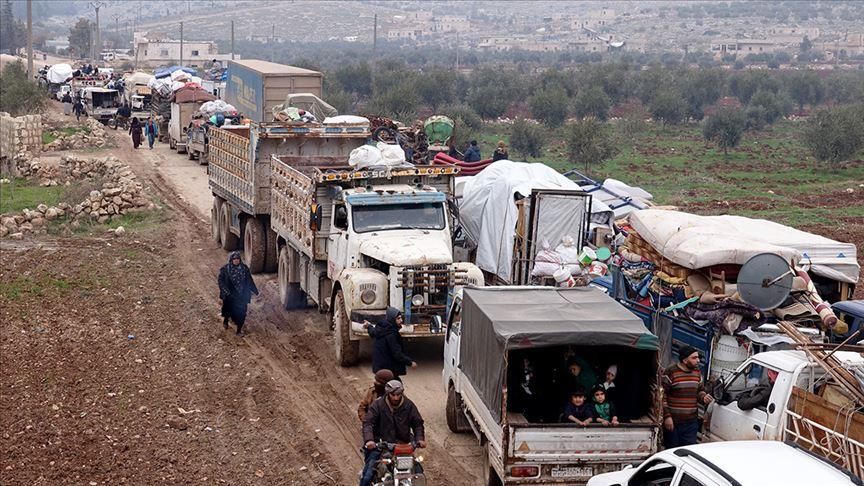Syria: 36,000 civilians flee Idlib de-escalation zone
Attacks by Assad regime, its allies force thousands of people to leave their homes

IDLIB, Syria
Around 36,000 more civilians have fled their homes falling inside the Idlib de-escalation zone in Syria over the last two days and the number of displaced civilians reached 450,000 since November 2019 due to attacks of the regime and its allies.
According to Syria's Response Coordination Group, the displaced civilians headed to areas near the Turkish border due to the attacks which violate a cease-fire agreement between Turkey and Russia.
Mohammad Hallaj, the director of the group, told Anadolu Agency that the civilians left their homes in Darat Izzah, Atarib, Haiian, Hraytan, Anadan, Khan Tuman, Khan al-Asal, Kafr Naya, and al-Qasimia due to attacks supported by Russian air strikes.
As a result of Assad regime and Russia forces’ attacks, 36,007 civilians, consisting 11,691 families, became homeless in the last two days.
Approximately 450,000 civilians have been displaced from the settlements of Idlib’s southern, southeastern, and Aleppo’s western and southern rural areas since Nov. 2019.
Due to the rising displaced population, the tent camps in Idlib fail to meet the needs of war-weary Syrians as there is not enough space to set up more tents. Thousands of families are currently in dire need of humanitarian assistance.
Some displaced people arrived in tent camps along Turkey’s borderline and some fled to areas of Peace Spring and Olive Branch operations which Turkish army cleared of terrorists.
Since 2016, Turkey has launched a trio of successful anti-terrorist operations across its border into northern Syria to prevent the formation of a terror corridor: Operations Euphrates Shield (2016), Olive Branch (2018), and Peace Spring (October 2019).
In September 2018, Turkey and Russia agreed to turn Idlib into a de-escalation zone in which acts of aggression are expressly prohibited.
But more than 1,300 civilians have been killed in attacks by the regime and Russian forces in the de-escalation zone since then as the cease-fire continues to be violated.
As a fresh move, Turkey announced on Jan. 10 that a new cease-fire in Idlib rocked by violence -- though “acts of aggression” are already officially banned -- was set to start just after midnight on Jan. 12.
Separately, a day earlier, Russia’s Defense Ministry announced a cease-fire in the region taking effect at 2.00 p.m. local time (1200GMT).
However, the regime and Iran-backed terrorist groups continued their ground attacks despite the fresh cease-fire.
More than 1 million Syrians have moved near the Turkish border due to intense attacks over the last year.
Since the eruption of the bloody civil war in Syria in 2011, Turkey has taken in some 3.7 million Syrians who fled their country, making it the world’s top refugee-hosting country.
* Writing by Davut Demircan from Ankara.
Anadolu Agency website contains only a portion of the news stories offered to subscribers in the AA News Broadcasting System (HAS), and in summarized form. Please contact us for subscription options.









